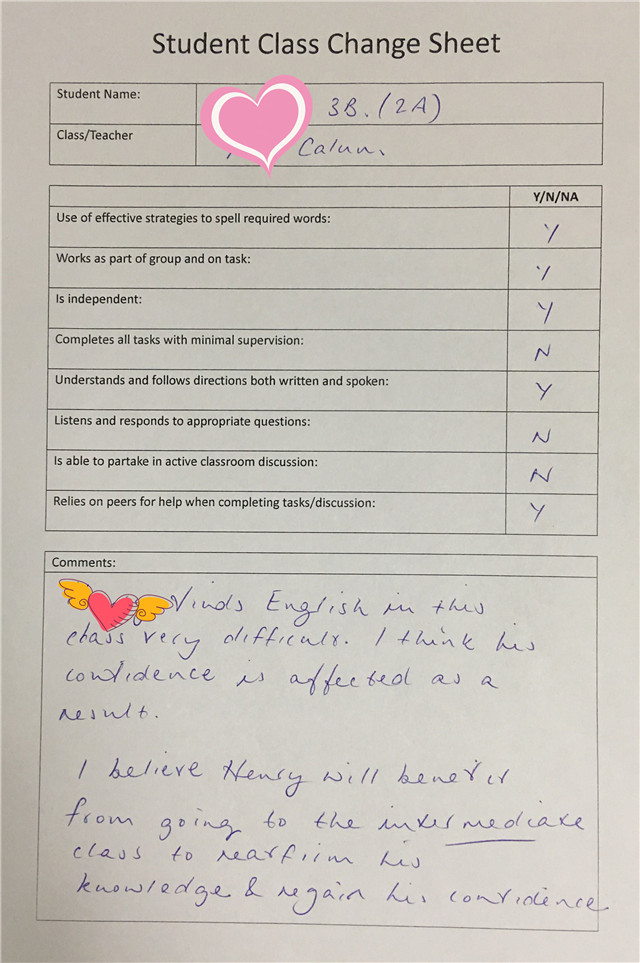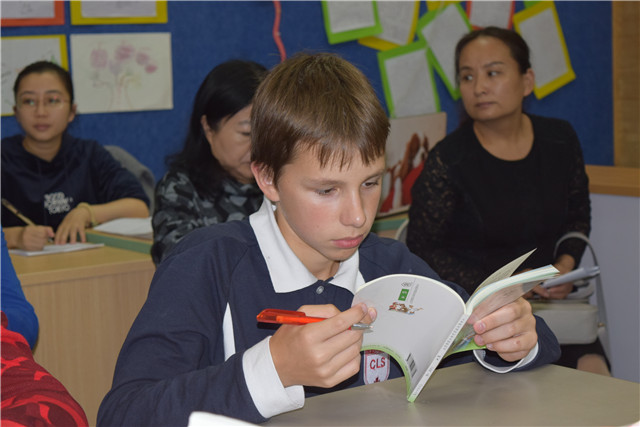广州市番禺区剑桥郡加拿达外国语学校
本学年广州市番禺区剑桥郡加拿达外国语学校国际教学部根据孩子的英语水平而非年龄分班,针对外教课堂开始实行分层走班制。剑桥郡加拿达外国语学校认为孩子们在语言掌握程度大致相同的群体里能够将学习效率最大化,希望家长们能了解关于这个项目实施效果的评估方式,以及实施过程中所观察到的一些问题。
分层走班制由学校外籍主管Mr.Mark负责管理实施。Mr.Mark在EFL领域非常专业,在亚洲有着多年的教学经验,也是目前学校任职时间最长的老师之一,非常了解学生和家长的需求与期望。本学期新任外籍校长Mr.Paul加入,凭借他在中国14年的教学和管理经验,进一步保障了本项目的实施。
关于分层走班制,学校在每周的教师会议上都会对学生的情况作出评估并对新的安排计划进行讨论。Mr.Mark检查未及时向他反馈走班近况的教师的工作,每周至少一次。老师会凭借自己的专业度和课堂观察去评估班上的每一个学生,如果需要调整会及时向Mr.Mark给出建议。另一方面,外籍教师会和中方英语老师进行沟通了解学生在中方英语课堂里的表现,以便得到更综合客观的评估。所以我们不会制定一个固定的时间去对学生做出相应的调整,而是通过专业的判断去及时对学生进行不同的分配(调高或调低)。
对于孩子年级调整的标准,学校特意制定了一张评估表,其内容涵盖了学生有效学习必需的八大核心概念,这些有助于科学评估一个孩子是否适应目前所在的年级。这些评估表将会反馈到外籍主管Mr.Mark处,由他来最终评估该学生是否真的需要做出调整。

学生年级调整的评估表
The Class Change Sheet
也许引起一些观念的差异是基于大家对目标要求的标准不同。比如一名学生在一次测试中达到80分或以上可能就会被分到更高一个等级,然而我们并不这样去操作,因为我们希望更加全面综合客观的去评估一个学生的水平。另外,如果一个学生这段时间状态很好,但是并没有被分到更高水平的班级,是因为考虑到曾经他有过因为学习困难而导致害羞或课堂参与度不高的痛苦经历,所以学校认为目前这种状态对于其自信心和学习兴趣的提升都最适合。

值得一提的是教师要对学生进行有意义的、诚实的、个性化的评估,以满足每位学生的需要。教师定期告知学生学校对他们的期待和标准,让学生很清楚地明白要往上提升必须要符合的要求。家长们可以观察孩子们的表现,向孩子们解释学校的标准。学校随时乐意为大家解读分层走班制评估系统以及任何一项举措实施的原因。
剑桥郡加拿达外国语学校将逐步引进国际IB育人理念,定期报告,和家长们分享更多的评估表和联系表,加强家校之间的有效沟通,欢迎广大家长前往学校参与相关探讨。
八大核心概念
1.使用有效的方法拼写相关单词;
2.有团队意识,能和团队一起完成任务;
3.独立自主;
4.主动完成学习任务;
5.在书写和口语方面能很好地理解老师的指令;
6.认真听老师提出的问题并且给与合适的回复;
7.主动参与课堂讨论;
8.在完成任务或讨论时寻求伙伴的帮助。
Internal Assessment in the Levelled International Program
Canadian Foreign Language School – Cambridgeshire (CLS-C)
This school year, our international department has moved to a model which is unfamiliar territory for the parents and students of CLS-C, where students are primarily grouped according to level rather than according to ages. The foundational underpinning for our international academic team is that student learning can be better maximized by having teachers differentiate lessons towards students whose grasp of language arts is roughly the same in all students. We thought it best to take the time to share with our school community the ideas upon which we based our student assessments and some of our observations from the school year thus far.
Our system is led by our Head International Teacher, Mr. Mark. Mr. Mark has extensive experience with the needs of EFL learners, having spent a long time in education in Asia, and is the longest-serving member of the CLS-C team. Mr. Mark’s understanding of the needs of students and the expectations of CLS-C parents positions him uniquely. New this term is Mr. Paul, working as International Principal for CLS-C, who is adding his knowledge and 14 years of experience in China to the mix to help provide direction to our program.
Informal meetings are held in the staff room on a near constant basis, to discuss the placement of students within the leveled program. Mr. Mark checks in weekly, at a minimum, with teachers who haven’t approached him about the progress and achievements of their students. Teachers are empowered to use their professional training and instincts to measure and chart students’ learning in their classroom and advise Mark on their perceptions. Other informal discussions are held with Chinese English teachers to get their input on how a student performs in the English-based parts of study at CLS-C. All members of staff are encouraged to approach Mr. Mark about any students they feel may either be progressing beyond their current leveled program or falling beyond in their current designation, with Mr. Mark ensuring that all international teachers are consulted at least once per week. Students who show significant progress, or in some cases lag, in their international class performance enter into a more formalized system of reviewing their placement. This is not to say that international teachers are not performing summative and formative assessments regularly, but rather to say that they use these regular assessments to form professional judgements on which students need to be entered into the formal review process used to assign levels.
The Class Change Sheet is the formal tool used for determining altering the placement of any given child. It presents eight core ideas that are indicators of effective learning in students. These ideas are assessed on an age-appropriate basis to determine whether the current level is providing any given child the best chance to succeed in their learning environment. There is room, as well, for any additional information the teacher feels is relevant for consideration in moving a student to a different leveled course. A review of the sheet is performed by Mr. Mark, the current international classroom teacher and the potential new international classroom teacher.
A difficult tenet for some to understand is a perceived lack of specific, knowledge-based targets or criteria proposed. Say for example, a student scoring 80% or above on a quiz is qualified automatically to move up to the next level. No such hard targeting is used in our process. The reason for this is that our international department assesses on the basis of serving the needs of the whole child. There may be a student, for example, who is thriving in their current level who is not moved up because their current level is good for their confidence in being one the class’ high-achievers when they may previously have been more shy, reserved and reluctant to participate.
What is important to us is that teachers assess students meaningfully, honestly and on an individualized basis to meet the needs of every student for whom they are directly, or indirectly, responsible. Students have expectations explained to them regularly by their international teachers and should have a clear understanding of what is required if they are hoping to advance in levels. Parents can investigate how their child is performing and are entitled to a thoughtful explanation as to how the leveling system works in the case of their child and how they are being assessed. We are always willing and ready to explain our system and the decisions made within it.
Going forward, with the incoming IB/PYP philosophy we’re moving toward, we’ll be sharing more student self-assessments and contact sheets with parents. This type of regular reporting will help to strengthen the connection between home and school.
Hopefully this brief overview of how assessment is handled in our leveled program has shed some light on how our international department works. We invite you to arrange times to come in and talk to us about our program. We are proud of the work we do and are eager to share our thoughts and ideas.
Eight Core Ideas
1 Use of effective strategies to spell required words
2 Works as part of group and on task
3 Is independent
4 Completes all tasks with minimal supervision
5 Understands and follows directions both written and spoken
6 Listen and responds to appropriate questions
7 Is able to partake in active classroom discussion
8 Relies on peers for help when completing tasks/discussion

| 

